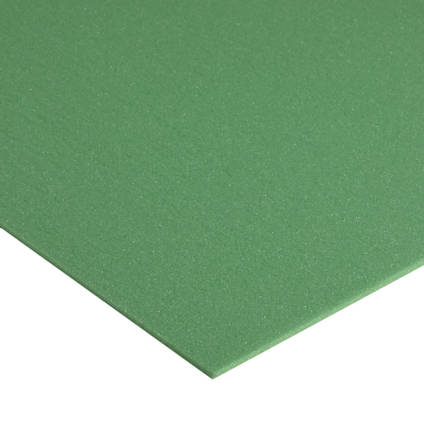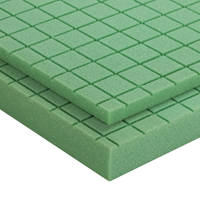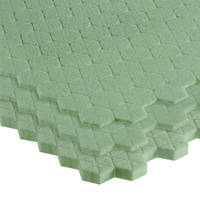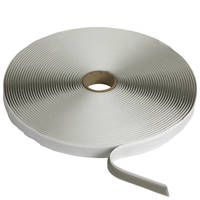Need any help or advice?+44 (0)1782 454499
Specification
Weight and Dimensions
| Length | 540 | mm |
|---|---|---|
| Width | 505 | mm |
Product Data
| Colour | Green | |
|---|---|---|
| Max Service Temp | 80 | °C |
| Thickness | 3 | mm |
| Chemistry / Material | PVC | |
| Density (Dry) | 75 | kg/m³ |
Mechanical Properties
| Tensile Strength | 1.89 | MPa |
|---|---|---|
| Tensile Modulus | 75 | MPa |
| Compressive Strength | 1.33 | MPa |
| Compressive Modulus | 72.5 | MPa |
| Plate Shear Strength | 1.09 | MPa |
| Plate Shear Modulus | 27.7 | MPa |
| Plate Shear Elongation at Break | 20.25 | % |
| Water Absorption | 1 | % |
General Properties
| Gross Weight | 0.067 | kg |
|---|
Shipping Information
Restrictions
This product is not classed as dangerous goods for transport and can be shipped to all destinations without restriction.
Shipping to EU countries is now done through our European subsidiary based in the Netherlands. All EU customers should use www.easycomposites.eu.
Package Size
There are no package size restrictions or surcharges for this product.
Delivery Cost
To find the delivery cost of this item to your address, add it to your basket and then use the instant shipping calculator on the basket page.
EasyCell75 Closed Cell PVC Foam
- PVC75-025-3
- No reviews
EasyCell 75 is a closed cell, cross-linked PVC foam core with a nominal density of 75kg/m³. It's combination of high mechanical performance, low resin uptake, ease-of-use and value for money make PVC foam one of the most widely used core materials in composites and an excellent choice for a wide range of sandwich panel/foam core laminates. The plain version listed on this page is suitable for hand-layup, vacuum bag and press lamination.
Available in 3mm, 5mm, 10mm and 25mm thickness in a choice of sheet sizes.
PRODUCT VERSIONS
Sheet Size
Thickness
AVAILABILITY:More than 10 availablefor immediate shipping
Trade discounts
| 0-9 | 10+ |
|---|---|
| £5.00 | £4.60 |
We won’t be beaten on price!
If you believe you’re buying an equivalent product cheaper elsewhere, contact us to discuss your requirements.
75kg/m³ Closed Cell PVC Foam Core sheets with a nominal density of 75kgs/m³ are suitable for use as a core material in a wide range of composites applications including flat sheet and moulded parts.
Our EasyCell75 Closed Cell PVC Foam is one of the simplest core materials to use. It is relatively inexpensive, offers excellent mechanical performance and is compatible with all standard resin systems including polyester, vinylester and epoxy. If you're looking for a simple yet effective way to stiffen your composite parts whilst minimising weight and cost then EasyCell75 structural foam is a great choice.
Typical Uses
As a high performance, low cost core material EasyCell75 is suitable for a wide range of application including:
- Aero model making
- Recreation equipment such as skis, snowboards, kiteboards and wakeboards
- Motorsport body panels, floors and splitters
- Aircraft interiors, fuselages
- Architectural panels, cladding, enclosures
- Marine hulls, decks, hatches and floors
- Wind energy turbine blades, enclosures
Advantages
- Almost no resin uptake
- Almost no water absorption
- Excellent strength to weight ratio
- Good thermal insulation
- Fire retardant (self extinguishing)
- Will not rot
- Good styrene resistance
- Good impact and fatigue resistance
How to Buy
EasyCell75 is available to buy online in 1020mm x 1085mm sheets and handy 505mm x 540mm sheets. Generally, there is no problem butt-jointing multiple sheets of core material in a composite and smaller sheets also makes them easier to handle and ship.
This structural foam can also be supplied in full sheet sizes of 1020x2180mm by request but shipping costs will be considerably higher.
Easy Composites are a major distributer of closed cell PVC foam and we should be able to beat any like-for-like quote. If you require larger quantities (such as full boxes) then please contact us for pricing.
Further Information
Processing
The closed cell structure means that the foam will not absorb resin (like Coremat will for example) meaning the core stays resin free, reducing the weight and cost of the finished composite.
The closed cell structure also means that PVC foam can be used in vacuum manufacturing processes it very well suited to RTM, resin infusion and vacuum bagging as well as conventional open lamination. The fine cell structure is an excellent bonding surface compatible with most standard resin systems including epoxy, polyester and vinylester.
EasyCell75 can be heated (with a heat gun) and reshaped to follow the contours of a moulded part, especially in its thinner thicknesses.
Thickness
EasyCell75 is available in 3mm, 5mm, 10mm and 25mm thicknesses. The thinner 3mm and 5mm sheets are ideal for lighter applications like making thin foam-core panel or aerospace use where the 10mm and 25mm thickness are ideal for use in thicker sandwich panels and larger applications such as marine, rail and architectural use. The 10mm and 25mm sheets are difficult to bend with or without heat and so are generally used flat.
Trade discounts
| 0-9 | 10+ |
|---|---|
| £5.00 | £4.60 |
We won’t be beaten on price!
If you believe you’re buying an equivalent product cheaper elsewhere, contact us to discuss your requirements.
75kg/m³ Closed Cell PVC Foam Core sheets with a nominal density of 75kgs/m³ are suitable for use as a core material in a wide range of composites applications including flat sheet and moulded parts.
Our EasyCell75 Closed Cell PVC Foam is one of the simplest core materials to use. It is relatively inexpensive, offers excellent mechanical performance and is compatible with all standard resin systems including polyester, vinylester and epoxy. If you're looking for a simple yet effective way to stiffen your composite parts whilst minimising weight and cost then EasyCell75 structural foam is a great choice.
Typical Uses
As a high performance, low cost core material EasyCell75 is suitable for a wide range of application including:
- Aero model making
- Recreation equipment such as skis, snowboards, kiteboards and wakeboards
- Motorsport body panels, floors and splitters
- Aircraft interiors, fuselages
- Architectural panels, cladding, enclosures
- Marine hulls, decks, hatches and floors
- Wind energy turbine blades, enclosures
Advantages
- Almost no resin uptake
- Almost no water absorption
- Excellent strength to weight ratio
- Good thermal insulation
- Fire retardant (self extinguishing)
- Will not rot
- Good styrene resistance
- Good impact and fatigue resistance
How to Buy
EasyCell75 is available to buy online in 1020mm x 1085mm sheets and handy 505mm x 540mm sheets. Generally, there is no problem butt-jointing multiple sheets of core material in a composite and smaller sheets also makes them easier to handle and ship.
This structural foam can also be supplied in full sheet sizes of 1020x2180mm by request but shipping costs will be considerably higher.
Easy Composites are a major distributer of closed cell PVC foam and we should be able to beat any like-for-like quote. If you require larger quantities (such as full boxes) then please contact us for pricing.
Further Information
Processing
The closed cell structure means that the foam will not absorb resin (like Coremat will for example) meaning the core stays resin free, reducing the weight and cost of the finished composite.
The closed cell structure also means that PVC foam can be used in vacuum manufacturing processes it very well suited to RTM, resin infusion and vacuum bagging as well as conventional open lamination. The fine cell structure is an excellent bonding surface compatible with most standard resin systems including epoxy, polyester and vinylester.
EasyCell75 can be heated (with a heat gun) and reshaped to follow the contours of a moulded part, especially in its thinner thicknesses.
Thickness
EasyCell75 is available in 3mm, 5mm, 10mm and 25mm thicknesses. The thinner 3mm and 5mm sheets are ideal for lighter applications like making thin foam-core panel or aerospace use where the 10mm and 25mm thickness are ideal for use in thicker sandwich panels and larger applications such as marine, rail and architectural use. The 10mm and 25mm sheets are difficult to bend with or without heat and so are generally used flat.
Specification
Weight and Dimensions
| Length | 540 | mm |
|---|---|---|
| Width | 505 | mm |
Product Data
| Colour | Green | |
|---|---|---|
| Max Service Temp | 80 | °C |
| Thickness | 3 | mm |
| Chemistry / Material | PVC | |
| Density (Dry) | 75 | kg/m³ |
Mechanical Properties
| Tensile Strength | 1.89 | MPa |
|---|---|---|
| Tensile Modulus | 75 | MPa |
| Compressive Strength | 1.33 | MPa |
| Compressive Modulus | 72.5 | MPa |
| Plate Shear Strength | 1.09 | MPa |
| Plate Shear Modulus | 27.7 | MPa |
| Plate Shear Elongation at Break | 20.25 | % |
| Water Absorption | 1 | % |
General Properties
| Gross Weight | 0.067 | kg |
|---|
The Highest operating temperature for our EasyCell75 Closed Cell PVC foam is 80 °C.
No, it's not suitable for autoclave/high temperature use. At prepreg curing temperatures (around 90°C) the Easy-Cell will soften which, combined with the pressure of an autoclave, would compress it. It is potentially possible to use the EasyCell with prepreg if they're cured at the lowest possible temperature (around 75°C) for a long time under vacuum only pressure but positive pressure from an autoclave would compress the foam, even at this lower temperature.
Although from a technical standpoint, PVC can be cut by laser, it generates acids and toxic fumes which can damage the laser equipment and are also hazardous to health. For that reason, we would not recommend cutting PVC by laser.
Well, firstly, it would be ESSENTIAL to use the drilled and grooved version of the EasyCell 75, not this solid version. The obvious reason for that being that the resin which is carried along the top face by the mesh and peel-ply needs to drop down through the core to the other side. Without the holes to drop through or the grooves to help with resin flow on the underside then you will just end up with a totally dry underside.
Assuming that you switch over to the drilled/grooved version of the foam then, to answer your question, you would certainly need infusion mesh and peel ply to facilitate the resin flow across the top layer of laminate, which in turn would then drop down through the holes and spread (via the grooving) on the underside.
Yes the sheet can be butt joined together during the foam core panel assembly to give sheet surface areas bigger than the foam sheet size. You can bond the sheets together using a foaming PU adhesive such as 'Gorilla Glue'
Yes, EasyCell 75 is easily shaped and sanded by hand to achieve a set profile for your core.
Yes, certainly. The density of the foam is 75kg/m3. The density of water is 1000kg/m3 anything with a density lower than water will float so as you can see the density of EasyCell75 is much lower than that of water and so it will very much float and could be used as bouyancy.
I'm afraid that we don't have thermal conductivity/insulation figures for the foam. Although not designed as an insulator it is still a closed cell foam and so the thermal insulation of the foam would be comparible to other foams of the same density.
For such a large surface area, the best way to bond the foam into place is to use our EL2 Epoxy Laminating Resin spread over the surface of the panel in a thin layer. As always, ensure you prepare the surface of the panel using a coarse abrasive paper and then remove any dust or grease traces.
Although our EasyCell75 is rigid enough to have tool shapes cut out of it and hold tools in place, it is not highly durable in such a situation and with regular use the foam would start to break up. I think for a tool tray it would be better to have a more foam more like a sponge-rubber which is not something that we sell.
That would really depend on the resin system that you use. Most composite resin systems (epoxy, polyester, vinylester) will bond well to the PVC but epoxy bonds the best. Once cured, the tissue layer should be well bonded to the PVC foam.
ASK YOUR OWN QUESTION
Customer Product Reviews for EasyCell75 Closed Cell PVC Foam
SUBMIT YOUR OWN PRODUCT REVIEW
We publish all reviews for verified purchases. Submit your own review and help other customers with their choices.SUBMIT YOUR OWN PRODUCT REVIEW
We publish all reviews for verified purchases. Submit your own review and help other customers with their choices.Shipping Information
Restrictions
This product is not classed as dangerous goods for transport and can be shipped to all destinations without restriction.
Shipping to EU countries is now done through our European subsidiary based in the Netherlands. All EU customers should use www.easycomposites.eu.
Package Size
There are no package size restrictions or surcharges for this product.
Delivery Cost
To find the delivery cost of this item to your address, add it to your basket and then use the instant shipping calculator on the basket page.
RELATED PRODUCTS
CUSTOMERS ALSO PURCHASED
RELATED PRODUCTS
CUSTOMERS ALSO PURCHASED
100% SECURE
PAYMENT METHODS


Easy Composites Ltd, registered in England 7486797. All content copyright (C) Easy Composites Ltd, 2025. All rights reserved.



